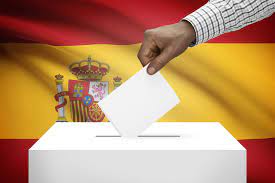
In the Spanish Parliamentary Monarchy, in april of 2019, elections were held in which five of the 16 political parties had the chance to reach the government. The Socialist Workers Party (PSOE, led by Pedro Sánchez), Popular Party (PP, led by Pablo Casado), citizens (led by Albert Rivera), United we can (led by Pablo Iglesias) and the Vox (led by Santiago Abascal). Knowing about your multiparty system, their elections work with proportional voting and a closed list, therefore, votes are in favor of the party and unchangeable (increasing the dependence of representatives of their political parties and leaders). With this in mind, we know that political clashes between parties are common because they have different ideologies, beyond rivalries, such as PSOE and PP, which are the parties with the greatest national influence. Logo, a national clash between left and right is fought in Madrid, after the governor, Isabel Ayuso (Popular Party), resign your position. Then, the vice prime minister of Spain, Pablo Iglesias (United we can), resigns to dispute the government of Madrid.
Yet, this is not the first time that the country has gone to the polls at the request of an after-hours election, Spanish politics is paralyzed and no one seems to have the solution to unlock it. The election in Spain, occurred on the day 10 from November, it was the fourth since december of 2015 and the last was held day 4 from May of 2021. In the April elections 2019, the victory was for the left bloc (PSOE), even though the PP party tried to reduce the visibility of the socialists with tension strategies. However,, the party itself suffered with its criterion of diminishing electoral support., causing it to reduce the presence of the popular in Congress, even having a coalition with Citizens. In November 2019, PSOE and we can, reached an agreement, with the attempt of a new formation of left government for the new elections, in search of unlocking Spanish politics, but slowing it down even more and giving impetus to the Popular Party (PP) – which passes from 66 chairs for 87 – and allowed the extreme right to explode: Vox jumps from 24 for 53 chairs. Even with all this change and increase in electoral support from rivals, the President of Government, Pedro Sanchez, won again, however the degree of difficulty to form a government with an absolute majority has become even more difficult.
Citizens' party popularity begins to collapse, after its poor performance in the November General Elections 2019 and a failure to overthrow the Murcia regional government through an unexpected no-confidence vote. In the year of 2021, the party together with the Spanish Socialist Workers Party, exposed a surprise action of non-confidence in the Murcia region going against the Government of the People and Citizens Party. The non-existent success of the action was due to the abandonment of Citizens' deputies and generated a "political earthquake" throughout the country. Consequently, high-ranking party members left the party and regional elections. Lastly, Governor Isabel Díaz's decision on her resignation from office and anticipation of elections, was declared after the Citizens Party's break with the government of the Conservatives of the Popular Party in the Murcia region for the attempt to govern with the Socialists.
currently, Isabel Díaz stabilizes as a political phenomenon in Spain, winner of local elections, which occurred now in May of 2021, the President of the Government of the Community of Madrid, governs in comfort and won't need the support of the far-right Vox for every law. The block on the right wins a difference of 18 left chairs, a fact that hadn't occurred in two years. in view of the event, Pablo Iglesias (candidate of the United We Can) leaves the policy claiming that it has not been the difference it expected. In 2023, new elections will take place and will serve as a reassessment of the current government's management, which until then promises freedom to deny taxes, protect public education, concerted private (mix of public and private) and take care of the health of individuals during the pandemic..
REFERENCES
The country. Socialist victory in Spain. 29 Apr 2019. Available in: https://brasil.elpais.com/brasil/2019/04/28/opinion/1556485948_524143.html
BALAGO, Rafael. leaf. Early election in Madrid turns left and right into clash. 31 mar 2021. Available in: Early election in Madrid turns into a national clash between …https://www1.folha.uol.com.br ›world› 2021/03 > the…
CUÉ, Carlos. The country. Elections in Spain are high on the far right and do not open the way to form a government. 11 nov 2019. Available in: https://brasil.elpais.com/brasil/2019/11/10/internacional/1573402081_937586.html
MAIL. Early elections in Madrid shake police in Spain. 10 mar 2021. Available in: https://correio.rac.com.br/_conteudo/2021/03/agencias/1072630-eleicoes-antecipadas-em-madri-sacodem-a-politica-na-espanha.html
COHEN, Sandra. G1.Breaking victory of the right in Madrid reconfigures politics in Spain. 05 May 2021. Available in: https://g1.globo.com/mundo/blog/sandra-cohen/post/2021/05/05/vitoria-arrasadora-da-direita-em-madri-reconfigura-politica-na-espanha.ghtml
NEWSPAPER. Psoe and Podemos agree to form left-wing government in Spain. 12 nov 2019. Available in: https://www1.folha.uol.com.br/mundo/2019/11/psoe-e-podemos-chegam-a-acordo-para-formar-governo-de-esquerda-na-espanha.shtml
Authors: Gabriel Arcanjo and Luiza Abate
